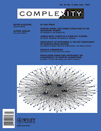
COMPLEXITY
Scope & Guideline
Fostering Collaboration in the Realm of Complexity
Introduction
Aims and Scopes
- Complex Systems Modeling and Analysis:
Research papers often explore the dynamics and behaviors of complex systems, including ecological models, economic systems, and social networks, using mathematical and computational techniques. - Interdisciplinary Applications of Complexity Theory:
The journal emphasizes the application of complexity theory in diverse fields such as ecology, sociology, economics, and engineering, showcasing how complex interactions influence system behavior. - Data-Driven Approaches and Machine Learning:
There is a significant focus on employing machine learning and data analytics to solve complex problems, enhance predictions, and optimize systems, reflecting the growing trend towards data-centric research. - Control Systems and Optimization Techniques:
Many studies involve developing control strategies for complex systems, including adaptive control, robust control, and optimization algorithms, highlighting practical implications for engineering and technology. - Epidemiological Modeling and Public Health:
The journal publishes research on modeling infectious diseases and public health dynamics, particularly in the context of global health challenges such as pandemics.
Trending and Emerging
- Artificial Intelligence and Machine Learning:
There is a notable increase in publications utilizing AI and machine learning techniques for predictive modeling, optimization, and data analysis, indicating a strong trend towards integrating these technologies into complexity science. - Network Theory and Graph Analysis:
Research focusing on complex networks, including social networks, ecological networks, and transportation networks, is trending, highlighting the importance of network structures in understanding complex systems. - Sustainability and Environmental Impact:
Emerging themes related to sustainability, including the impact of climate change and resource management, are increasingly featured, reflecting global concerns and the need for sustainable solutions. - Dynamic Systems and Control Strategies:
A growing interest in the dynamics of complex systems and the development of innovative control strategies to manage these systems effectively is evident, particularly in engineering and robotics. - Health Informatics and Epidemiological Modeling:
Research related to health informatics, especially in the context of epidemic modeling and public health responses, has surged, particularly in light of recent global health crises.
Declining or Waning
- Traditional Statistical Methods:
There seems to be a shift away from classical statistical methods towards more advanced machine learning and data-driven approaches, indicating a waning interest in conventional techniques. - Basic Theoretical Discussions:
The journal's focus has increasingly moved towards applied research and case studies, with fewer publications dedicated to purely theoretical discussions or foundational aspects of complexity science. - Single-Domain Applications:
Research that is limited to a single domain, without interdisciplinary connections, appears to be less favored. There is a growing preference for studies that integrate multiple fields and perspectives. - Qualitative Research Methods:
Qualitative studies have become less frequent, as the journal increasingly prioritizes quantitative and computational methodologies that provide measurable outcomes and predictive insights.
Similar Journals

Networks and Heterogeneous Media
Fostering Interdisciplinary Research in Complex NetworksNetworks and Heterogeneous Media is a distinguished journal published by the American Institute of Mathematical Sciences (AIMS), focusing on the dynamic interplay of networks across various interdisciplinary fields including applied mathematics, computer science, and engineering. With a diverse and robust scope, the journal aims to facilitate the advancement of knowledge regarding complex systems and heterogeneous media through the publication of cutting-edge research. The journal has exhibited notable academic impact, currently positioned in Q2 and Q3 quartiles across several key categories such as applied mathematics, engineering, and statistics, indicating its relevance and influence within the scientific community. Researchers and professionals exploring intricate mathematical models, computational applications, and statistical methodologies will find Networks and Heterogeneous Media an invaluable resource for both foundational studies and innovative applications. The journal regularly publishes high-quality articles, contributing to emerging discussions and developments in a rapidly evolving field.

International Journal of Applied Mathematics and Computer Science
Exploring the Frontiers of Applied Mathematics and Computer ScienceThe International Journal of Applied Mathematics and Computer Science is a premier open-access journal published by SCIENDO, dedicated to advancing knowledge in the interdisciplinary fields of applied mathematics, computer science, and engineering. Since its inception in 2001, the journal has continually provided a platform for researchers to publish high-quality, peer-reviewed articles, contributing significantly to its fields, as evidenced by its strong Q2 quartile rankings in 2023 across key disciplines. With a notable impact factor and ranking within the Scopus database—#135 in Applied Mathematics and #45 in Computer Science—the journal emphasizes innovative research and practical applications. Open access since 2014, it has aimed to foster collaboration and ensure that vital scientific knowledge is accessible to a broader audience, positioning itself as an essential resource for researchers, professionals, and students seeking to stay on the cutting edge of technological and mathematical advancements.

SIAM-ASA Journal on Uncertainty Quantification
Exploring methodologies that tackle uncertainty head-on.The SIAM-ASA Journal on Uncertainty Quantification, published by SIAM PUBLICATIONS, is a premier journal dedicated to advancing the field of uncertainty quantification across various disciplines, including applied mathematics, statistics, and simulation modeling. With an impressive impact factor that places it in the Q1 quartile in multiple categories such as Applied Mathematics and Statistics and Probability, this journal represents the pinnacle of research quality and relevance. Established in 2013, it has garnered a significant readership and citation rate, reaffirming its critical role in addressing complex uncertainty challenges in modern science and engineering. Although not an open access journal, it provides a platform for rigorous peer-reviewed articles that offer insightful methodologies and applications vital to both research and industry practices. Researchers, professionals, and students will find in its pages a wealth of knowledge that drives the future of quantitative analysis, modeling, and problem-solving in uncertain environments.
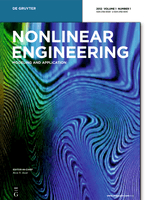
Nonlinear Engineering - Modeling and Application
Connecting Theory and Application in Nonlinear EngineeringNonlinear Engineering - Modeling and Application is a premier journal dedicated to advancing the fields of engineering, modeling, and simulation, published by De Gruyter Poland Sp. z o.o. since 2012. With an impressive impact factor reflected in its prestigious rankings—Q2 in Chemical Engineering and Miscellaneous Engineering and Q3 in Computer Networks and Communications—this journal serves as an invaluable resource for researchers and practitioners seeking to explore the intricacies of nonlinear systems and their applications. As an Open Access journal since 2019, it ensures that groundbreaking research is readily available to the global community, fostering collaboration and innovation. Situated at the forefront of its field, Nonlinear Engineering provides high-quality, peer-reviewed articles that contribute to understanding complex phenomena in various engineering disciplines, making it an essential publication for those eager to stay on the cutting edge of technology and research.

Radio Electronics Computer Science Control
Illuminating the Path of Scientific Discovery in Eastern EuropeRadio Electronics Computer Science Control is a distinguished academic journal published by the ZAPORIZHZHYA NATIONAL TECHNICAL UNIVERSITY that has been committed to advancing the fields of radio electronics, computer science, and control systems since its inception in 1999. With an open access model, the journal ensures that high-quality research is freely available to a global audience, fostering collaboration and innovation among researchers, professionals, and students alike. While the current impact factor is not listed, the journal remains an essential resource for those seeking to explore cutting-edge developments in technology and engineering, contributing significantly to the interdisciplinary dialogue among scholars in these domains. The journal publishes original research articles, reviews, and case studies, making it a vital platform for disseminating knowledge and advancing scientific understanding in the rapidly evolving landscape of computer and control systems. Located in Zaporizhzhya, Ukraine, the journal serves as a beacon of scholarly communication in Eastern Europe and beyond.

Electronic Research Archive
Empowering Researchers Through Accessible KnowledgeElectronic Research Archive is a prominent open-access journal published by the AMER INST MATHEMATICAL SCIENCES-AIMS, dedicated to disseminating high-quality research across various domains of mathematics. Since its inception in 2019 and gaining open-access status in 2022, this journal has rapidly established itself within the academic community, achieving a commendable Q2 ranking in the Mathematics (miscellaneous) category as of 2023. With an E-ISSN of 2688-1594, it caters to both emerging and established researchers by providing a platform for innovative findings and critical discussions in mathematical sciences. Positioned at the heart of the United States, the journal serves as an essential resource for enhancing collaboration and knowledge-sharing among academics worldwide. Researchers and practitioners alike will benefit from its robust publication model and commitment to advancing mathematical inquiry and education.
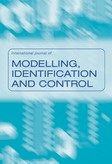
International Journal of Modelling Identification and Control
Unveiling cutting-edge research in identification and control.The International Journal of Modelling Identification and Control, published by INDERSCIENCE ENTERPRISES LTD, serves as a pivotal platform for the dissemination of cutting-edge research in the fields of applied mathematics, computer science applications, and modeling and simulation. With an ISSN of 1746-6172 and E-ISSN 1746-6180, this journal has been a crucial resource for academics and professionals since its inception in 2006, and it continues to engage researchers worldwide, aspiring to advance the methodologies and applications within these disciplines through high-quality publications. As a Q4 ranked journal in several categories according to the 2023 metrics, it provides insights into the evolving landscape of modeling and control techniques, aiming to bridge the gap between theoretical research and practical implementations. While not primarily open access, the journal allows readers from diverse backgrounds to explore and contribute to essential findings, fostering innovation and collaboration. The journal’s relevance is amplified by its engaging editorial content that invites submissions reflecting contemporary challenges and advancements, particularly from those at the forefront of analytical research and computational applications.

Ecological Complexity
Fostering groundbreaking research in ecological dynamics.Ecological Complexity is a prestigious academic journal published by Elsevier, dedicated to advancing the understanding of complex ecological systems through innovative modeling and analysis. With an ISSN of 1476-945X and an E-ISSN of 1476-9840, this journal has been a critical platform for researchers since its inception in 2004, with a forecasted operation until 2024. The journal enjoys an esteemed Q2 ranking in both the Ecological Modeling and Ecology, Evolution, Behavior and Systematics categories as of 2023, highlighting its significant impact and relevance in the field. Additionally, it ranks impressively in Scopus, with 85th out of 721 in the Ecology category and 11th out of 41 in Ecological Modeling, illustrating its commitment to high-quality research dissemination. While it does not currently offer Open Access options, Ecological Complexity remains a vital resource for ecologists, environmental scientists, and interdisciplinary researchers aiming to deepen their understanding of ecological interactions and systems. The journal is based in the Netherlands at RADARWEG 29, 1043 NX, AMSTERDAM, and serves as an essential forum for fostering innovative research that bridges theoretical concepts and practical applications in ecology.
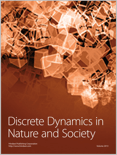
DISCRETE DYNAMICS IN NATURE AND SOCIETY
Connecting Mathematics to Life: The Dynamics of Discrete SystemsDISCRETE DYNAMICS IN NATURE AND SOCIETY is a leading academic journal published by HINDAWI LTD, specializing in the intricate interrelationship between discrete modeling and its applications in both natural phenomena and societal dynamics. Established as an Open Access journal since 1997, it ensures that research outputs are freely accessible to a global audience, fostering collaboration and innovation within the field. Based in the United States, this journal has seen substantial contributions to the domains of mathematics, modeling, and simulation, achieving a commendable Q3 category ranking for its impact in these areas. With its robust focus on empirical research and the theoretical underpinnings of discrete systems, the journal appeals to a diverse readership including researchers, professionals, and students eager to explore and contribute to the ongoing discussions shaping our understanding of dynamics in complex systems.
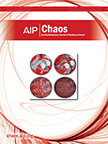
CHAOS
Charting New Territories in Nonlinear DynamicsCHAOS, an esteemed journal published by AIP Publishing, is a cornerstone of interdisciplinary research, focusing on the intricate dynamics of complex systems across various scientific domains. With a balanced impact factor, this journal emphasizes high-quality contributions in Applied Mathematics, Mathematical Physics, and Statistical and Nonlinear Physics, while also exploring intersections with Medicine and Physics and Astronomy. With rankings showing a remarkable percentile placement, notably #7 in Mathematical Physics and #10 in Statistical and Nonlinear Physics, CHAOS has established itself as a leading platform for disseminating groundbreaking research since its inception in 1991. This journal not only aims to foster collaboration among scientists but also to advance theoretical and computational frameworks that unravel the complexities of chaotic systems. Researchers, professionals, and students alike will find rich insights and innovative theories within its pages, making it an invaluable resource in the pursuit of knowledge and understanding in the modern scientific landscape.